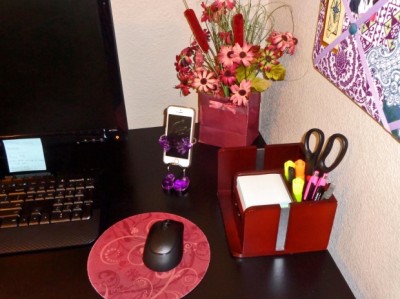Last updated on March 25th, 2023 at 10:47 pm

When I first started writing, I listened to many authors’ interviews. NPR’s Author Interviews had in-depth chats with well-known authors. I subscribed to The Writer magazine and Writer’s Digest.
I devoured articles and books. I listened to audios and watched videos. I loved hearing how each author “made it.”
Each story was a little different and had morsels I could apply to my writing life. It was inspiring. Hearing that someone just like me could become a writer and published author said one thing – I could do it too.
When my memoir, Breaking the Code, came out in 2011, I was in a strange position. Suddenly it was me up there speaking about being an author. It was a weird role reversal. The questions from readers were the same questions I’d had when I was sitting in the hard metal folding chair in the audience.
I’ve learned a lot along the way to, and since, publication. The most important thing I learned is how to make writing a priority. It’s the key to everything else. It’s the key to seeing your writing dreams become a reality.
22 Tips for Getting it Done Now
1. Pay yourself first: That’s the advice financial advisers give, and it’s appropriate for your writing dream too. Make it such a high priority that you do nothing else until your writing is done. If you spend your time on everything else first, guess what? You’ll never get that novel or memoir written.
2. Writers write – no matter what: Write every day. Make a plan and stick to it. The vision of a writer flying through page after page, inspiration flowing through their fingertips, is a myth.
Good writers write when they’re inspired. Great writers write when they’re not.
3. Writer’s Hurdle vs. Writer’s Block: In the moments (or days) when nothing is coming, keep your butt in that chair! As Anne Lamott says, “Give yourself permission to write a shitty first draft.” What matters is that you’re writing. I like the phrase, Writer’s Hurdle, rather than Writer’s Block. A hurdle is something that gets in the way. There’s a way around it. So, write around it until you get to the other side – then run to the finish line!
4. Make inspiration a routine: Choose a ritual of inspiration to begin your writing routine each day. I watch particular writing podcasts or inspirational YouTube videos, like Marie T.V., before I start writing every day. I might listen to it while on a walk or even in the shower, but I am sure to infuse my spirit with inspiration before I put pencil to paper.
5. Turn everything off – Decide on blocks of time that you will write (or create) and then protect that time like it was your firstborn. That time is your number one priority. Yes, you can turn everything off. Of course, you need a plan for emergencies. Designate one person you can trust to be your emergency contact for the hours you’re writing. Then turn everything off; home phone, cell phone, etc. When your writing time is up, check your messages. I promise you, 99% of the time, there won’t be any emergencies. Your world managed just fine without you.
6. Go on artist dates: Let’s face it, writing is lonely. So, make a plan to get out of the house once a week to go on a date with yourself and a local art venue. Go to an art gallery or a showing at your favorite coffee shop. Experiencing other creatives is a boost to your creative self. Julia Cameron used the term Artist Dates in her book, The Artist’s Way. Here is a list of 101 date ideas.
7. Keep your space in “ready mode”: Whether you have a dedicated office or your desk is the kitchen table, leave it each day in ready order to begin your next writing session. Nothing waters procrastination more than a messy space that requires cleaning before you can get to work.

8. Reward yourself with something that enhances your writing: When you achieve a goal and successfully make writing a priority, reward yourself. Take a trip to see the home of a favorite writer.
Pretend you’re a tourist in your town and spend time people-watching at your downtown cafe’. You can use those observations later as you build characters.
Buy a new pen or poster board to map out your book. I recently ordered a writing t-shirt, and I love it!
9. Know your limits – break before them: Do you know how long you can write and still be productive? Do you know when your brain just shuts off? You should. For me, it’s three hours.
At the three-hour mark, I’m pushing the words out; they aren’t good. So, right before time approaches, I carefully finish in a place in the middle of the action – motivating myself to go back to it. And then I take a break. You might eat lunch, go for a walk, knit, take a bath, play with the dog, or do anything else that doesn’t require mental energy. After your break, you can go back to renew.
10. Mantra: “I am a writer.” Repeat after me, “I am a writer.” It’s a powerful statement, and you know why? Because it’s a commitment. Once you say it, you become it. So…say it!
11. Jerry Seinfeld’s method: Jerry Seinfeld writes new material daily. And every day that he writes new material, he puts an X on his calendar. His goal is to have more Xs and to have them get closer and closer together. Try it.
12. Listen to your “self” regarding where to write: I fought against this one when I moved into my new home. I mean, for cryin’ out loud, I’m single now. There’s no one to interrupt me or demand anything of me. I should be able to write at home, right? Yeah, it would seem that way. But the truth is, sometimes I can, and often I can’t.
I write well in coffee shops. I don’t know why exactly, but I can tune out everything in a coffee shop, but at home, I can’t tune out the voice in my head that says, “Go load those dishes up…it won’t take long.” So, write where writing gets done.
13. Try Music: Whether or not you listen to music when you write is up to you. But if you do, choose a Pandora or other station that in some way relates to what you’re writing. This doesn’t mean you must listen to love songs if you’re writing a romance novel. It means that whatever is speaking to you as you write this book – that’s the music to listen to.
Test out different music – with words, without, instrumental, strings, tunes you recognize, or ones you don’t. See what works for you. This tells your brain, “Oh hey, it’s time to write.” It’s another of the pre-writing routines that can be very powerful and make for a more productive writing time.
14. Don’t share too soon: Many writers refuse to talk about their project until they are at a pre-determined place in the story they’re writing. That might be when the first draft is done or when you’re through the “muddy middle.” Writing a story has a pace of its own; when others are involved, that pace can feel wrong, too fast, too slow. Make a decision about when you’ll share, and then stick to it.
15. Set a deadline – tell someone: Look at the calendar and thoughtfully choose a deadline to set for yourself. Make that deadline a priority. Then tell someone. Choose someone trustworthy and someone who will remember and ask you about it. Being accountable, even in an artificial way, can be great motivation to finish on time.
16. Tell or don’t tell but make an informed decision: Resist the temptation to share with everyone you know about your dream. This can invite input you’re not ready to face. Think about how you’ll feel if this person doesn’t support you or sabotage your writing attempts. If you live with someone, this will be more difficult, but it can still be done. Downplaying what you’re doing is one way to do this. If you choose to tell people about your project, decide how much you’ll tell them, and then practice phrases like, “It’s going OK. Thanks for asking.”
17. Become a student of it: I learned this over 20 years ago. If you want to learn something and make it a priority, you have to put the time in – become a student of it. When I was writing a children’s book, I wondered how a favorite author gave such personality to her characters. So, after reading one of her books once for pleasure, I went through it again and studied it. Today, there’s just no excuse for not understanding how the publishing industry works or how to plot a novel. The information is there – find it.
18. Monk Mode: When you just have to get something done, you might need to go into Monk Mode. Maybe you’re finishing a freelance article or editing your book. Sometimes, life and loved ones must be put on hold while you finish your work.
19. Tune out everyone’s voice except your own: There is such a thing as getting too much information or advice – even from people who know what they’re talking about. Write the book that speaks to you at night. Share the story in the way it’s coming to you. Getting too many opinions can stifle your creative flow and stop you from writing the book only you can write.
Tune into your own voice – it’s the only one that matters.
20. Write a good book: Write the best book you can write. Worry about who will read it later.
21. Create a ritual: Many entrepreneurs and creative people have rituals around their work time. Creating a ritual of two or three steps can be your pre-heat button. When you pre-heat an oven, you’re preparing it for the main event – baking that cake or tray of cookies. A few options might be; to make a cup of tea, light a cinnamon candle, do some gentle stretching, turn on your desk lamp (even during the day), or write in a journal. This is another way to prime yourself for the task ahead. It tells the mind to get ready to write.
22. Break the Rules: In this information age, we are information addicts. Seriously, I think we might need to start a 12-step program soon. Doing a lot of research on writing can have a negative effect. There comes a time when you just have to pretend you know nothing and write in the way that comes naturally to you. Your writing might not fit the rules. Your book might not fit neatly in the genre. It doesn’t matter. Write the book that’s in you – THAT is what matters

Karen Alaniz is a writer, published author, and a home renovation expert now that she’s remodeled an old farmhouse by herself. She strives to help women who are scared it may be too late to start over after a certain age and she encourages empty-nest women to invent a new, prosperous and full life–just like she has done. You can read more about Karen on her Amazon Author page.
Note: Articles by Karen may contain affiliate links and may be compensated if you make a purchase after clicking on an affiliate link.




